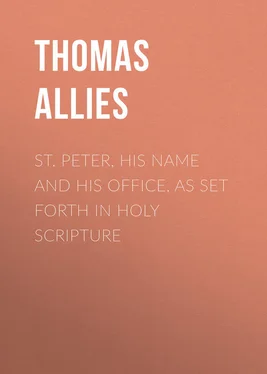Thomas Allies - St. Peter, His Name and His Office, as Set Forth in Holy Scripture
Здесь есть возможность читать онлайн «Thomas Allies - St. Peter, His Name and His Office, as Set Forth in Holy Scripture» — ознакомительный отрывок электронной книги совершенно бесплатно, а после прочтения отрывка купить полную версию. В некоторых случаях можно слушать аудио, скачать через торрент в формате fb2 и присутствует краткое содержание. Жанр: foreign_antique, foreign_prose, на английском языке. Описание произведения, (предисловие) а так же отзывы посетителей доступны на портале библиотеки ЛибКат.
- Название:St. Peter, His Name and His Office, as Set Forth in Holy Scripture
- Автор:
- Жанр:
- Год:неизвестен
- ISBN:нет данных
- Рейтинг книги:3 / 5. Голосов: 1
-
Избранное:Добавить в избранное
- Отзывы:
-
Ваша оценка:
- 60
- 1
- 2
- 3
- 4
- 5
St. Peter, His Name and His Office, as Set Forth in Holy Scripture: краткое содержание, описание и аннотация
Предлагаем к чтению аннотацию, описание, краткое содержание или предисловие (зависит от того, что написал сам автор книги «St. Peter, His Name and His Office, as Set Forth in Holy Scripture»). Если вы не нашли необходимую информацию о книге — напишите в комментариях, мы постараемся отыскать её.
St. Peter, His Name and His Office, as Set Forth in Holy Scripture — читать онлайн ознакомительный отрывок
Ниже представлен текст книги, разбитый по страницам. Система сохранения места последней прочитанной страницы, позволяет с удобством читать онлайн бесплатно книгу «St. Peter, His Name and His Office, as Set Forth in Holy Scripture», без необходимости каждый раз заново искать на чём Вы остановились. Поставьте закладку, и сможете в любой момент перейти на страницу, на которой закончили чтение.
Интервал:
Закладка:
Not weightier is the other objection, that the office of being the Foundation is too important to be entrusted to human care. Was there less difficulty in blessing being diffused from one man among all nations? Rather we must look on man not as he is by, and of, himself, apart from God, and left to his own weakness, but as upborne by divine power, according to the promise, "Behold, I am with you all days, until the consummation of the world." Who can doubt that man, in union with God, may serve for a foundation, and discharge those offices in which the unity of a structure consists? It is confidently and constantly objected, that "other foundation no man can lay beside that which is laid, which is Jesus Christ." 63 63 1 Cor. iii. 11.
As if what has been laid by Christ Himself, and consists in the virtue of Christ alone, can be thought other than Christ; or as if it were unusual, or unscriptural, for things proper to Christ to be participated by men. Therefore the chief difficulties against Peter's pre-eminence, and character as the Foundation, seem to spring from the mind failing to realise the supernatural order instituted by God, and the perpetual presence of Christ watching over His Church.
Thus it is no derogation to Abraham's being the Father of the faithful, or to the hierarchy of the Church instituted by Christ Himself, that our Lord says, 64 64 Matt. xxiii. 9.
"Call none your father upon earth, for one is your Father who is in heaven;" inasmuch as Scripture abundantly proves that divine gifts are richly conferred upon men. What more divine than the Holy Spirit? Yet it is written, 65 65 John xiv. 16.
"And I will ask the Father, and He shall give you another Paraclete, that He may abide with you for ever." What a higher privilege than filial adoption? Yet it is said, 66 66 Rom. viii. 15.
"Ye have received the spirit of filial adoption, by which we cry, Abba Father." What a greater treasure than co-inheritance with Christ? Yet we read, 67 67 Rom. viii. 17.
"but if children, also heirs: heirs of God, but joint heirs with Christ." What higher than the vision of God? Yet S. Paul bears witness, 68 68 1 Cor. xiii. 12.
"We see now through a glass darkly, but then face to face." What more wonderful than the power of remitting sins? Yet this very power is granted to the Apostles, 69 69 John xx. 23.
"Whose sins you shall forgive, they are forgiven them." What further from human weakness than the power of working miracles? Yet Christ establishes this, 70 70 John xiv. 12.
"Amen, amen, I say unto you, he that believeth on Me, the works which I do, shall he do also, and greater works than these shall he do." Indeed, the participation and communion of heavenly gifts have the closest coherence with that supernatural order, which God in creating man chose, and to which He called fallen man back through His only begotten Son; with that dispensation of Christ by which He loved the Apostles as He Himself was loved by the Father, by which He called them, 71 71 John xv. 9, 15.
"not servants, but friends," and gave them that glory which He had Himself received from the Father. And the tone of mind which denies Peter's prerogative as the Foundation of the Church, under pretence that it is an usurpation of divine power, tends to deny some one or all of the privileges just cited, and, as a fact, does deny some of them. It is 72 72 Passaglia, p. 442. n. 38.
wonderful to see how only common and vulgar things are discerned by modern eyes, where the Fathers saw celestial and divine gifts. Those without the Church have fallen away as well from the several parts and privileges, from what may be called the standing order, of the Incarnation, as from its final purpose and scope; and it is much if they would not charge with blasphemy that glorious saying put forth by the greatest of the Eastern, as by the greatest of the Western Fathers, "that God became man, in order that man might become God." 73 73 [Greek: O tou Theou Logos enênthrhôpêsen H hina hêmeis theopoiêthômen.] St. Athan. de Incarn. Factus est Deus homo, ut homo fieret deus. St. Aug. Serm. 13, de Temp.
Was, then, S. Chrysostome wrong when he said that our Lord, in that passage of Matthew, showed a power equal to God the Father by the gifts which He bestowed on a poor fisherman? "He who gave to him the keys of the heavens, and made him Lord of such power, and needed not prayer for this, for He did not then say, I prayed, but, with authority, I will build my Church, and I will give to thee the keys of heaven." 74 74 S. Chrys. Tom. vii. 786. Hom. 82, in Matt.
Was he wrong when he called him "the chosen of the Apostles, the mouth-piece of the disciples, the head of the band, the ruler over the brethren?" 75 75 Tom. viii. 525. Hom. 88, in Joan.
Or where he saw these prerogatives in the very name of Peter, observing, "When I say Peter, I mean the impregnable rock, the immovable foundation, the great apostle, the first of the disciples?" 76 76 Hom. 3, de Pœnitentia. Tom. ii. 300.
To sum up, then, what has been hitherto said, we have advanced so far as this; first the promise, and then the bestowal of a new name, expressing a singular pre-eminence, and in its proper sense befitting Christ alone, have distinguished Simon from the rest of the apostles. But much more the power signified by that name, and explained by the Lord Himself, carries far higher Peter's privilege, and indicates him to be the possessor of authority over the Apostles. For if Simon is the Rock of the Church, and if the property of Foundation, on which the structure of the Church rests, belongs to him immediately after Christ, and analogously with Christ, there arises this relation between Christ and Simon, that as He is first, and chiefly, and by inherent power, so Simon is secondarily, by participation and analogy, that which underlies, holds together, and supports the Apostles and the whole fabric of the Church.
Now such a relation carries with it not merely precedency of honour, but superior authority. The strength of the Apostles lay in their union with Christ, and subordination to Him. The like necessity of adhering to Peter is expressed in his new name. Take away that subordination, and you destroy the very image by which the Lord chose to express Peter's dignity; and you remove, likewise, Peter's participation in that property which the Lord communicated to him in the name of the Rock. For if the Apostles needed not to be joined with him, he had no title to be called the Foundation; and if he had no coactive power over the Apostles, he did not share the property by which Christ is the Rock and Foundation. Thus the name, and the dignity expressed by the name, show Peter to have been singly invested by the Lord with both honour and power superior to all the Apostles. 77 77 Passaglia, p. 48, 9.
CHAPTER II.
EDUCATION AND FINAL DESIGNATION OF PETER TO BE THE RULER WHO SHOULD CONFIRM HIS BRETHREN
Having promised 78 78 Passaglia, p. 68.
and bestowed on Simon a new name, prophetic of the peculiar position which he was to occupy in the Church, and having set forth the meaning contained in that name in terms so large and magnificent, that, as we have seen, the greatest saints and fathers have felt it impossible to exhaust their force, our Lord proceeded to educate Peter, so to say, for his especial charge of supreme ruler. He bestowed upon him, in the course of His ministry, tokens of preference which agree with the title thus solemnly conferred; and He instructed him with all the care which we should expect to be given to one who was to become the chief doctor of Christians. Such instruction may be said to consist in two things, a more complete knowledge of the Christian revelation, and a singular apprehension of its divine proofs.
Интервал:
Закладка:
Похожие книги на «St. Peter, His Name and His Office, as Set Forth in Holy Scripture»
Представляем Вашему вниманию похожие книги на «St. Peter, His Name and His Office, as Set Forth in Holy Scripture» списком для выбора. Мы отобрали схожую по названию и смыслу литературу в надежде предоставить читателям больше вариантов отыскать новые, интересные, ещё непрочитанные произведения.
Обсуждение, отзывы о книге «St. Peter, His Name and His Office, as Set Forth in Holy Scripture» и просто собственные мнения читателей. Оставьте ваши комментарии, напишите, что Вы думаете о произведении, его смысле или главных героях. Укажите что конкретно понравилось, а что нет, и почему Вы так считаете.












